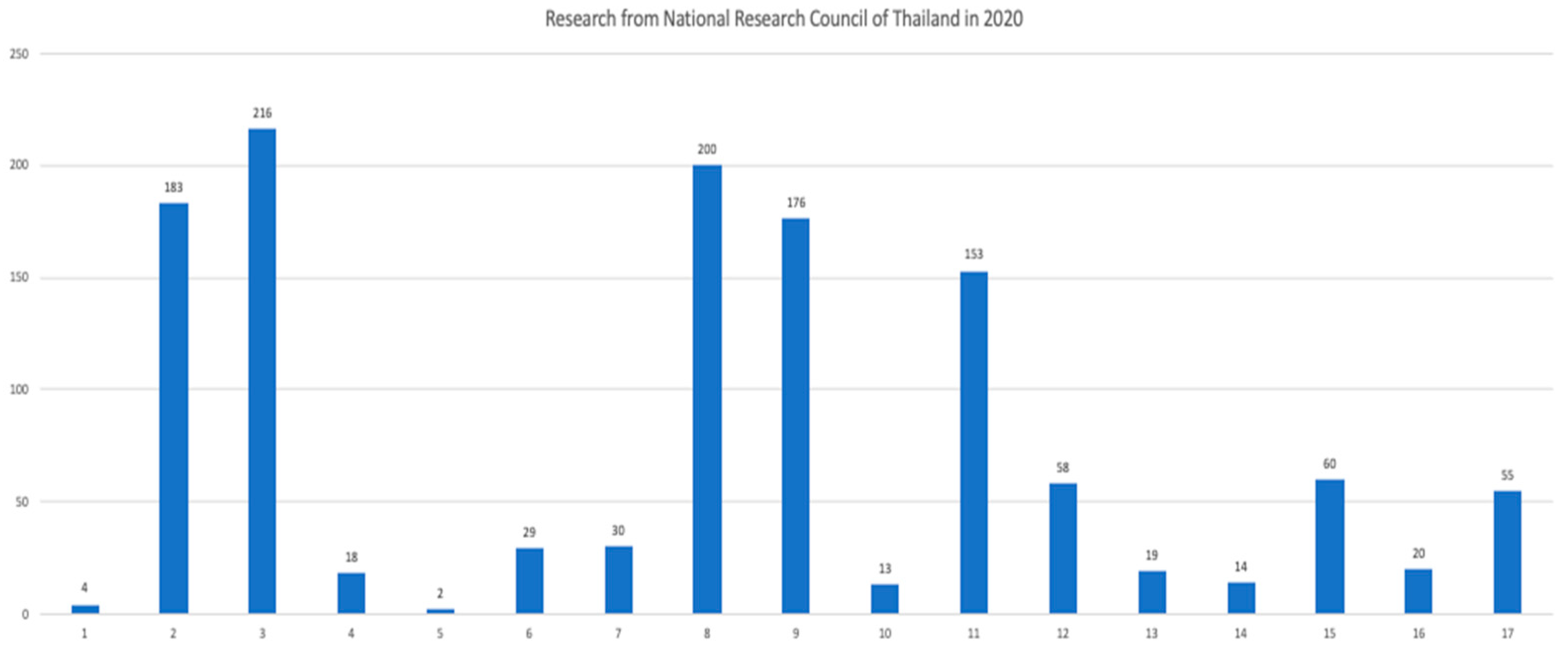Localizing SDGs in Thailand: Towards a More Inclusive National Science, Research, and Innovation (SRI) Plan †
Abstract
:1. Introduction
2. Sustainable Development in Thailand
3. Methods
3.1. Horizon Scanning
3.2. Modified Delphi Method
4. Results
4.1. Results from Horizon Scanning
4.2. Results from Delphi Surveys
5. Discussion
5.1. Trends from Horizon Scanning
5.2. Results from Delphi Surveys
6. Conclusions
Author Contributions
Funding
Institutional Review Board Statement
Informed Consent Statement
Data Availability Statement
Conflicts of Interest
References
- Thailand Science, Research, and Innovation (TSRI). Higher Education, Science, Research, and Innovation Plans and Strategies 2020–2027 and Science, Research, and Innovation Plan 2020–2027; TSRI: Bangkok, Thailand, 2020. (In Thai) [Google Scholar]
- UN. Report of the United Nations Conference on the Human Environment (Stockholm Conference); United Nations: New York, NY, USA, 1972. [Google Scholar]
- UN Secretary-General and World Commission on Environment and Development. Report of the World Commission on Environment and Development: Our Common Future; United Nations: New York, NY, USA, 1987. [Google Scholar]
- Palmer, G. The Earth Summit: What Went Wrong at Rio. Wash. Univ. Law Rev. 1992, 70, 1005. [Google Scholar]
- United Nations General Assembly. Transforming Our World: The 2030 Agenda for Sustainable Development; United Nations: New York, NY, USA, 2015. [Google Scholar]
- Ramirez, B. Neoliberalism, the Asian Financial Crisis, and Structural Adjustment Programs: The Case of Thailand. SSRN 2018, 3130457. [Google Scholar] [CrossRef]
- Khamchoo, C.; Nuangjamnong, N. Economic Development Model in 21st Century: From Washington Consensus to Beijing Consensus? NIDA Dev. J. 2014, 54, 1–31. [Google Scholar]
- The National Economic and Social Development Plan. Office of the National Economic and Social Development Council. Office of the Prime Minister (Thailand). Available online: https://www.nesdc.go.th/nesdb_en/main.php?filename=develop_issue (accessed on 22 July 2021).
- Office of the National Economic and Social Development Council. The Twelfth National Economic and Social Development Plan (2018–2021). Available online: https://www.nesdb.go.th/nesdb_en/download/article/article_20170705111314.pdf (accessed on 19 July 2021).
- The Drafting of the Thirteenth National Economic and Social Development Plan. Available online: https://www.nesdc.go.th/main.php?filename=plan13 (accessed on 19 July 2021). (In Thai).
- OECD. Strategic Foresight for Better Policies: Building Effective Governance in the Face of Uncertain Futures; Organisation for Economic Co-operation and Development: Paris, France, 2019. [Google Scholar]
- Bangkok Post. Thailand’s Exceptional Strengths as the World’s Medical Hub. 2020. Available online: https://www.bangkokpost.com/business/1933812/thailands-exceptional-strengths-as-the-worlds-medical-hub (accessed on 30 July 2021).
- Mulok, D.; Mori, K.; Rozilee, A.; Jaratin, L. Is Economic Growth Sufficient for Poverty Alleviation? Empirical Evidence from Malaysia. Cuad. Econ. 2012, 35, 26–32. [Google Scholar] [CrossRef] [Green Version]
- Wiriyapong, N. Marriage for Everyone. 2020. Available online: https://www.bangkokpost.com/business/1950364/marriage-for-everyone (accessed on 30 July 2021).
- Ramiah, R. Where Does Thailand Stand in Terms of LGBTI Rights and Interests in Enterprises, Employment, Immigration and Property Relations? Available online: https://www.ibanet.org/article/D34F014D-6552-453D-BAE7-3C8A8D1103A8 (accessed on 30 July 2021).
- UN Women. Thailand. Available online: https://asiapacific.unwomen.org/en/countries/thailand (accessed on 31 July 2021).
- Sumano, B. Bureaucratic Reform—The Way Forward. Available online: https://tdri.or.th/en/2020/10/bureaucratic-reform-the-way-forward/ (accessed on 31 July 2021).



Publisher’s Note: MDPI stays neutral with regard to jurisdictional claims in published maps and institutional affiliations. |
© 2022 by the authors. Licensee MDPI, Basel, Switzerland. This article is an open access article distributed under the terms and conditions of the Creative Commons Attribution (CC BY) license (https://creativecommons.org/licenses/by/4.0/).
Share and Cite
Phanthuwongpakdee, N.; Intaprasert, P.; Gongkaew, C.; Bunnag, C.; Wichachai, S.; Soontornthum, T. Localizing SDGs in Thailand: Towards a More Inclusive National Science, Research, and Innovation (SRI) Plan. Environ. Sci. Proc. 2022, 15, 15. https://doi.org/10.3390/environsciproc2022015015
Phanthuwongpakdee N, Intaprasert P, Gongkaew C, Bunnag C, Wichachai S, Soontornthum T. Localizing SDGs in Thailand: Towards a More Inclusive National Science, Research, and Innovation (SRI) Plan. Environmental Sciences Proceedings. 2022; 15(1):15. https://doi.org/10.3390/environsciproc2022015015
Chicago/Turabian StylePhanthuwongpakdee, Nuttavikhom, Pimnara Intaprasert, Chananchida Gongkaew, Chol Bunnag, Sawetachote Wichachai, and Thanyaporn Soontornthum. 2022. "Localizing SDGs in Thailand: Towards a More Inclusive National Science, Research, and Innovation (SRI) Plan" Environmental Sciences Proceedings 15, no. 1: 15. https://doi.org/10.3390/environsciproc2022015015
APA StylePhanthuwongpakdee, N., Intaprasert, P., Gongkaew, C., Bunnag, C., Wichachai, S., & Soontornthum, T. (2022). Localizing SDGs in Thailand: Towards a More Inclusive National Science, Research, and Innovation (SRI) Plan. Environmental Sciences Proceedings, 15(1), 15. https://doi.org/10.3390/environsciproc2022015015





